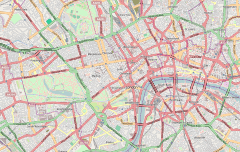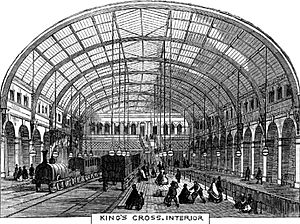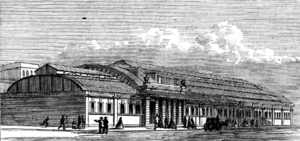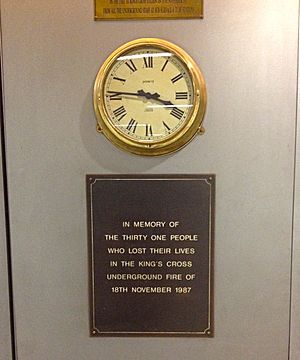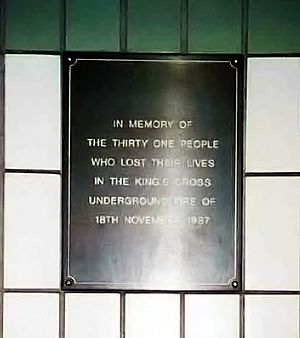King's Cross St. Pancras tube station facts for kids
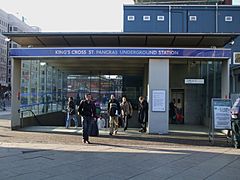
Entrance on Euston Road
|
|
|
Location of King's Cross St. Pancras in Central London
|
|
| Location | King's Cross |
|---|---|
| Local authority | London Borough of Camden |
| Managed by | London Underground |
| Owner | London Underground |
| Number of platforms | 8 |
| Accessible | Yes |
| Fare zone | 1 |
| OSI | London King's Cross and London St Pancras Int'l (National Rail) |
| London Underground annual entry and exit | |
| 2007 | 66.359 million |
| 2008 | |
| 2009 | |
| Key dates | |
| 1863 | Opened (MR) |
| 1906 | Opened (GNP&BR) |
| 1907 | Opened (C&SLR) |
| 1968 | Opened (Victoria line) |
| Other information | |
| Lists of stations | |
King's Cross St Pancras is a very busy London Underground station in Central London. It is located on Euston Road in the Borough of Camden. This station connects to the main King's Cross and St Pancras train stations.
It is in fare zone 1 and lets you change between six different Underground lines. King's Cross St Pancras was one of the first stations to open on the London Underground network.
The station first opened in 1863 with the Metropolitan line. It served the Hammersmith & City and Circle line trains. The station grew in 1868 when the City Widened Lines opened. Later, the Northern and Piccadilly platforms were added in the early 1900s.
During the 1930s and 1940s, the station was rebuilt to handle more passengers. The Victoria line connection was added in 1968. In 1987, a fire at the station sadly caused 31 deaths. This led to many important safety changes across the whole Underground system. The station was also greatly rebuilt in the early 2000s for Eurostar trains moving to St Pancras. It reopened in 2009.
Station History
Plans for the first underground station at King's Cross began in 1851. This was while the main train station was being built. The idea was to link the Great Western Railway (GWR) at Paddington with the Great Northern Railway (GNR) at King's Cross.
The Metropolitan Railway line opened on January 10, 1863. This was part of the very first section of the Metropolitan Railway. In 1933, major rebuilding work started. This included a direct link to St Pancras station and a round ticket hall. The main concourse opened on June 18, 1939. The subway link to St Pancras opened two years later.
The Metropolitan line platforms were closed for a while in 1940. This was due to bomb damage during the Blitz. More bomb damage happened in March 1941. A train, the station roof, and the platforms were damaged. Two railway workers also died.
New platforms were already being built as part of the station upgrades from the 1930s. These new platforms opened even though they were not finished on March 14, 1941. The Victoria line platforms opened on December 1, 1968. The station was updated again in 1986.
The 1987 Fire and Safety Changes
Fires had always been a risk on the underground network. Small spaces and limited escape routes made fires very dangerous. After a serious fire at Finsbury Park in 1976, staff were trained to look for any signs of fire.
On November 18, 1987, a passenger reported a small fire on an escalator. Staff were told, and it seemed like a minor incident. The Fire Brigade arrived with equipment. By then, the ticket hall was filling with smoke. Trains passed through the station without stopping, and people were being moved out.
Suddenly, a large fireball shot out from the escalator. It set the ticket hall on fire. The fire burned for several hours and was not fully put out until the next morning. Sadly, 31 people died, including a firefighter.
Experts later learned about something called the trench effect. This effect made the fire spread upwards very quickly. It caused the fire to explode into the station. Because of this terrible event, fire safety rules on the Underground became much stricter. Staff training also improved a lot. Wooden steps on escalators were replaced with metal ones.
Smoking had already been banned in underground areas since 1985. After the King's Cross fire, smoking was banned everywhere on the entire London Underground network. The fire caused a lot of damage, especially to the old wooden escalators where it began. Repairs and rebuilding took over a year. The Northern line platforms and the escalators to the Piccadilly line stayed closed until March 5, 1989.
Images for kids
See also
 In Spanish: Estación de King's Cross-Saint Pancras para niños
In Spanish: Estación de King's Cross-Saint Pancras para niños
 | Tommie Smith |
 | Simone Manuel |
 | Shani Davis |
 | Simone Biles |
 | Alice Coachman |


